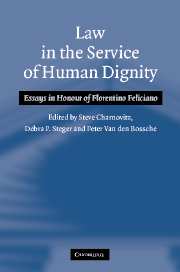Book contents
- Frontmatter
- Contents
- List of contributors
- Preface
- Biographical note
- List of abbreviations
- PART I Reflections on the contributions of Florentino Feliciano to international law
- PART II Insights into the World Trade Organization
- PART III The changing landscape of investment arbitration
- PART IV New challenges in international adjudication
- 21 From Preston to Prescott: globalizing legitimate expectation
- 22 The independence of the international judiciary: some introductory thoughts
- 23 ‘Straddling and highly migratory flags’ before the International Tribunal for the Law of the Sea
- 24 Collective security and the personalization of peace
- 25 Some thoughts on ‘Asian’ approaches to international dispute resolution
- 26 The Cameroon v. Nigeria; Equatorial Guinea Intervening (Land and Maritime Boundary) Judgment
- Bibliography of works by Florentino Feliciano
- Index
26 - The Cameroon v. Nigeria; Equatorial Guinea Intervening (Land and Maritime Boundary) Judgment
from PART IV - New challenges in international adjudication
Published online by Cambridge University Press: 29 July 2009
- Frontmatter
- Contents
- List of contributors
- Preface
- Biographical note
- List of abbreviations
- PART I Reflections on the contributions of Florentino Feliciano to international law
- PART II Insights into the World Trade Organization
- PART III The changing landscape of investment arbitration
- PART IV New challenges in international adjudication
- 21 From Preston to Prescott: globalizing legitimate expectation
- 22 The independence of the international judiciary: some introductory thoughts
- 23 ‘Straddling and highly migratory flags’ before the International Tribunal for the Law of the Sea
- 24 Collective security and the personalization of peace
- 25 Some thoughts on ‘Asian’ approaches to international dispute resolution
- 26 The Cameroon v. Nigeria; Equatorial Guinea Intervening (Land and Maritime Boundary) Judgment
- Bibliography of works by Florentino Feliciano
- Index
Summary
Introduction
It is a great honour to dedicate this chapter to Justice Florentino P. Feliciano, whose friendship for the past decade has been of valuable support in my searching for fairness and justice in international law. While his involvement in international commercial arbitrations has always been of general interest to me, Feliciano's promotion when Justice of the Philippine Supreme Court of the principle of the protection of the environment for present and future generations three years prior to its endorsement by the landmark 1997 Hungary/Slovakia Gabcikovo-Nagymaros Project judgment, and as the then President of the WTO Appellate Body, his promotion of this and other principles of the modern environmental law codified and progressively developed by this judgment, have been of illuminating impact upon the area of my specialization, the international law of the sea. Justice Feliciano was a member of the inaugural Annex VII Southern Bluefin Tuna Arbitral Tribunal, presided over by the then ICJ President Stephen M. Schwebel and also comprising Judge Per Tresselt, Ambassador Chusei Yamada, and Sir Kenneth Keith, which has remarkably enriched, through its 2000 Award, the procedural principles of peaceful settlement of the oceans and environmental disputes laid down in the UN Convention on the Law of the Sea (UNCLOS) in accordance with the United Nations Charter. However, as the Southern Bluefin Tuna Award involved highly developed states (Australia, New Zealand, and Japan) and the editors of this Liber Amicorum chose to focus it on developing states, my chapter will instead survey the 2002 Cameroon v. Nigeria; Equatorial Guinea Intervening (Land and Maritime Boundary) (Merits) judgment.
- Type
- Chapter
- Information
- Law in the Service of Human DignityEssays in Honour of Florentino Feliciano, pp. 378 - 408Publisher: Cambridge University PressPrint publication year: 2005



